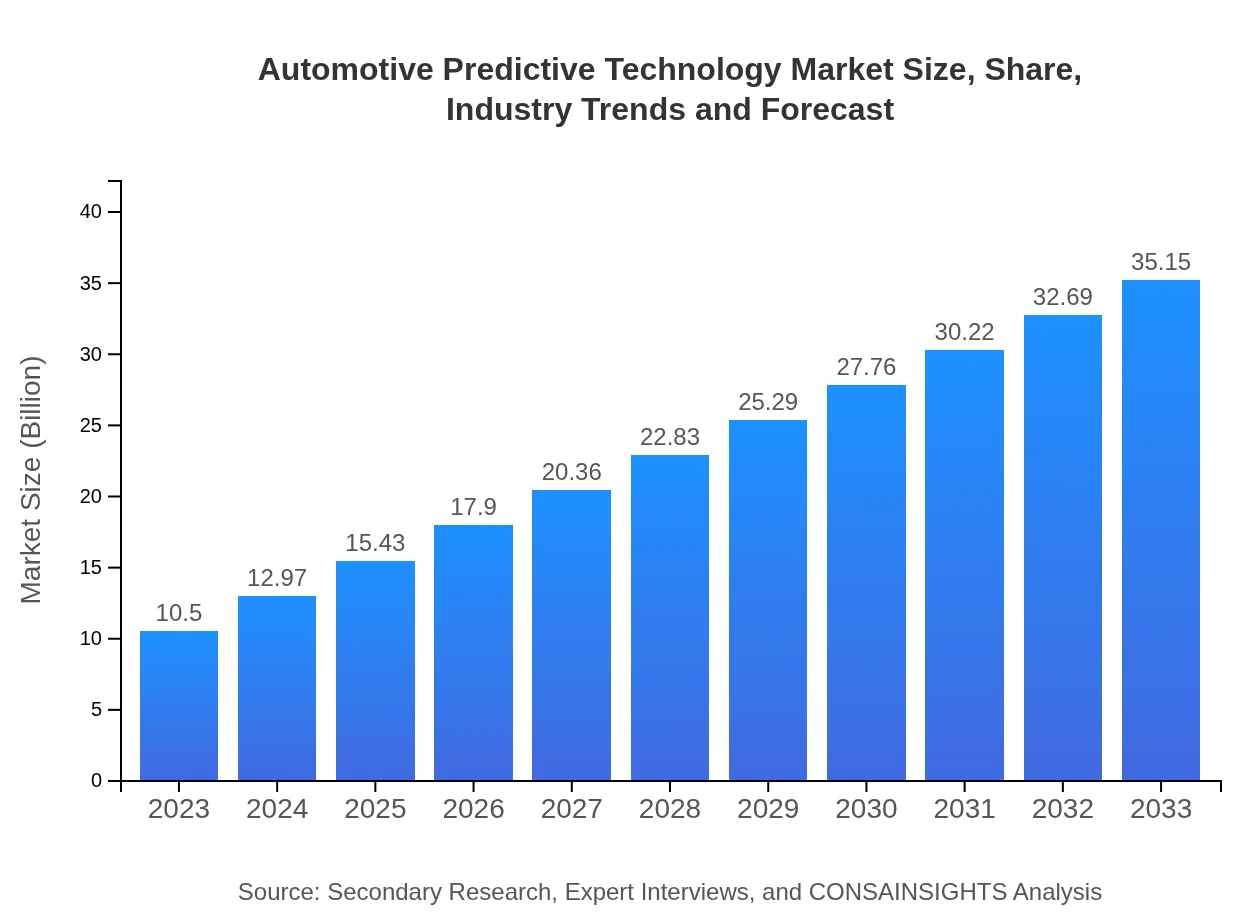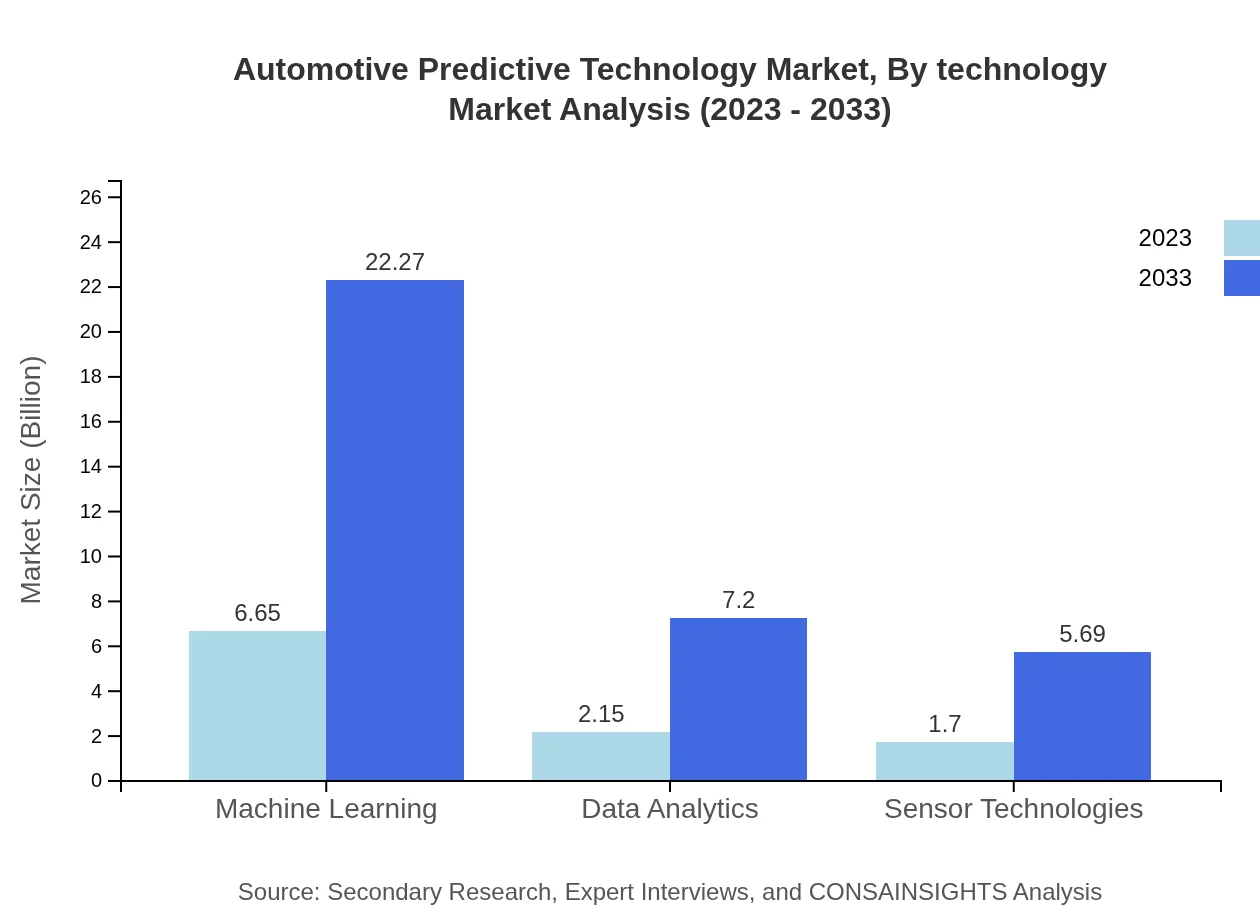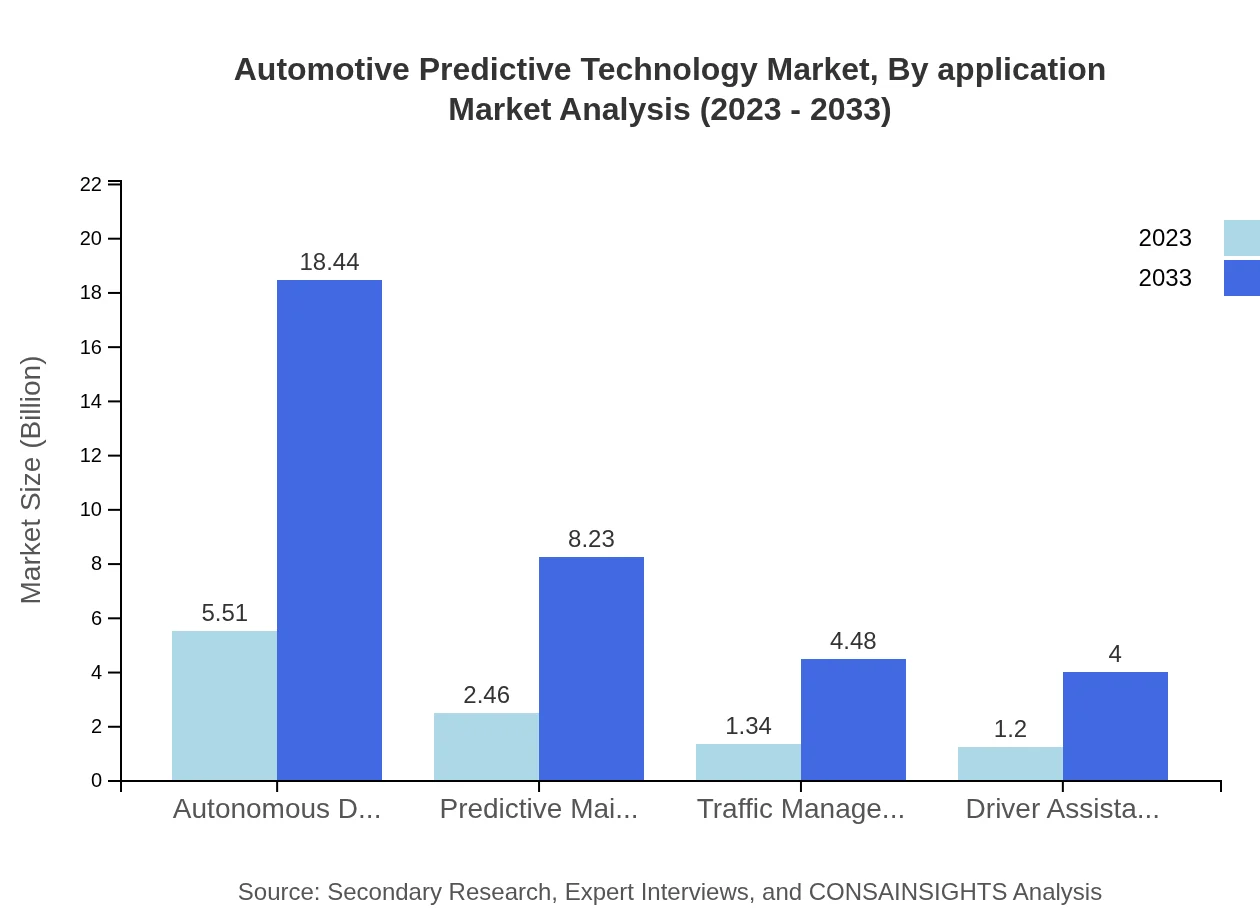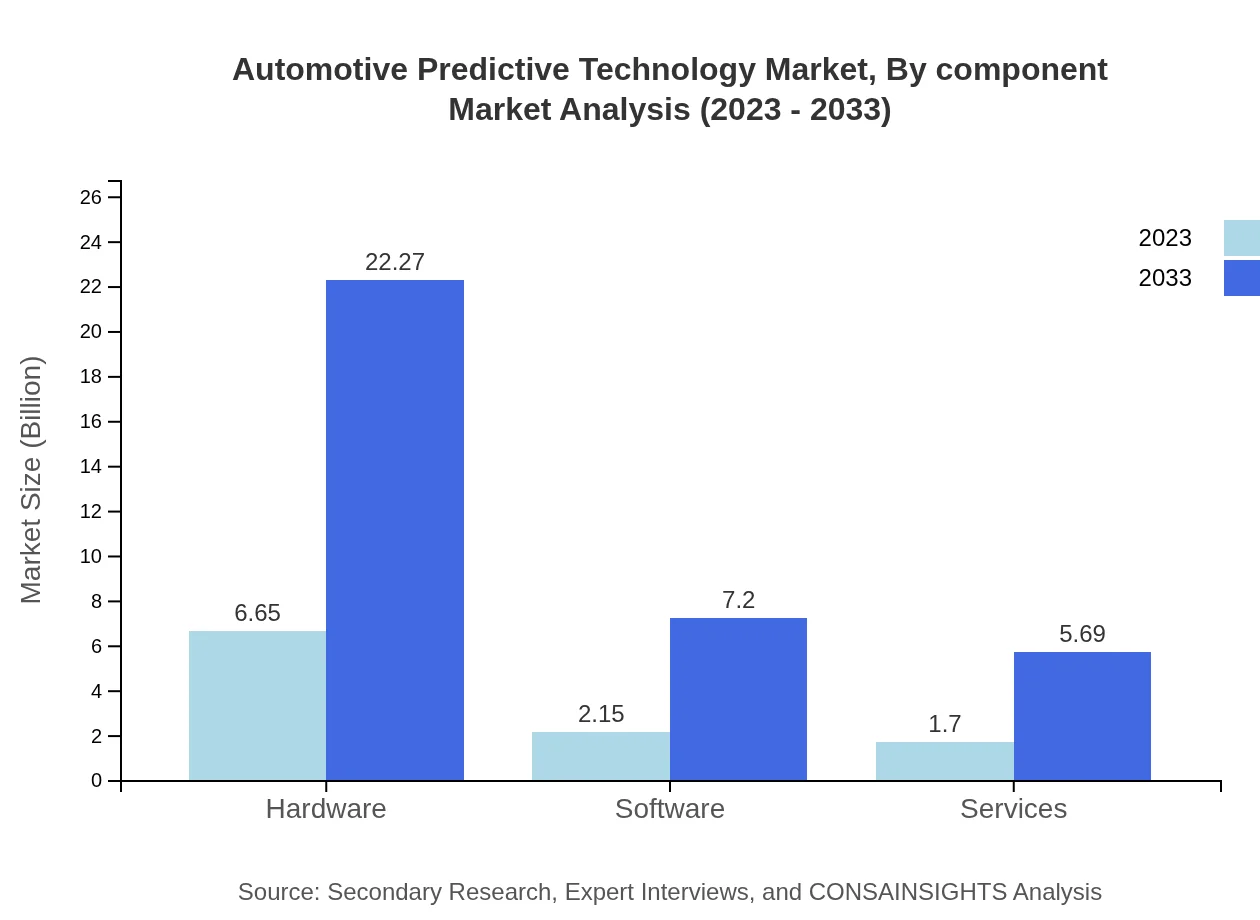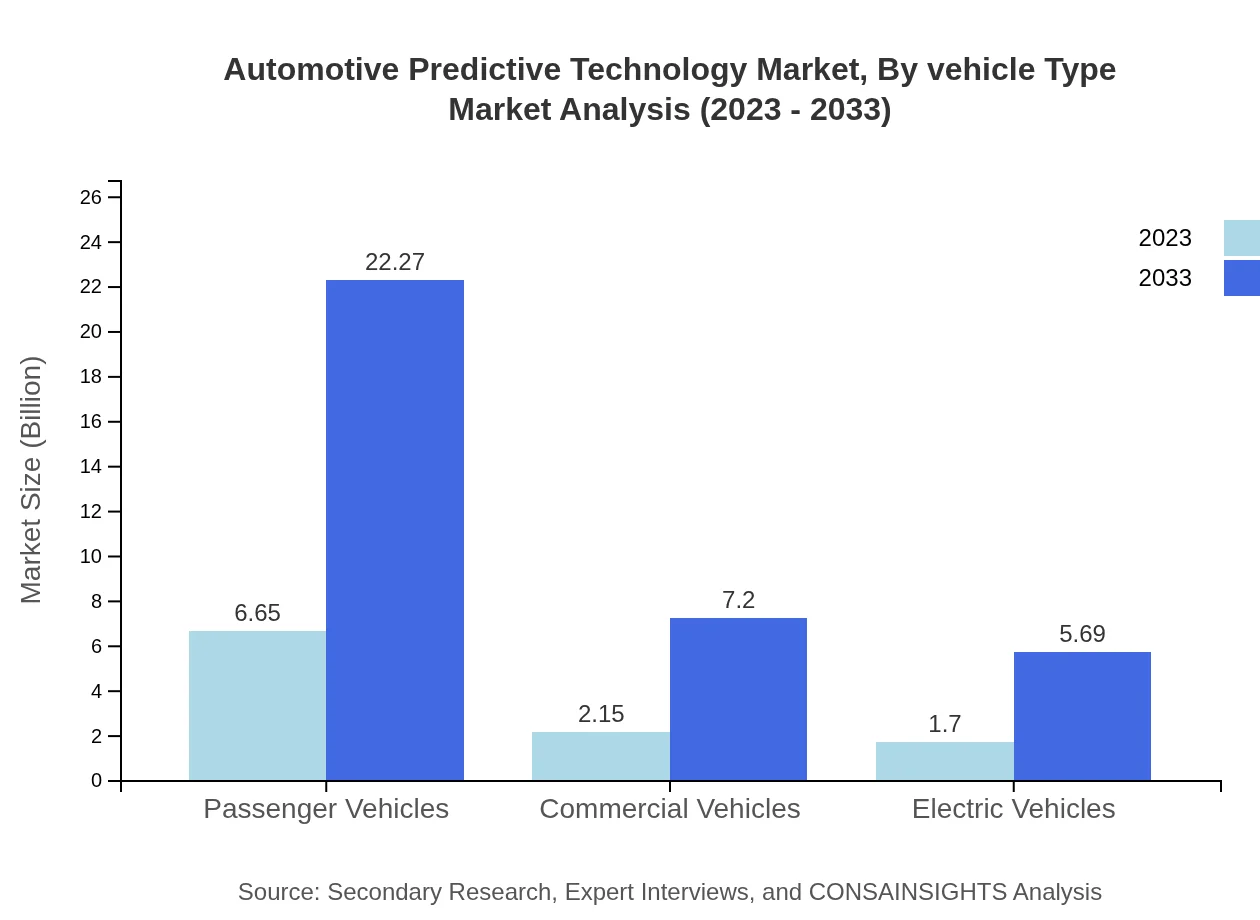Automotive Predictive Technology
Published Date: 02 February 2026 | Report Code: automotive-predictive-technology
Automotive Predictive Technology Market Size, Share, Industry Trends and Forecast to 2033
This report provides an in-depth analysis of the Automotive Predictive Technology market from 2023 to 2033, offering insights into market dynamics, trends, growth factors, and forecasts, as well as various segments including regional performance and technology advancements.
| Metric | Value |
|---|---|
| Study Period | 2023 - 2033 |
| 2023 Market Size | $10.50 Billion |
| CAGR (2023-2033) | 12.3% |
| 2033 Market Size | $35.15 Billion |
| Top Companies | IBM, Tesla Inc., NVIDIA Corporation, Continental AG, General Motors |
| Last Modified Date | 02 February 2026 |
Automotive Predictive Technology Market Overview
Customize Automotive Predictive Technology market research report
- ✔ Get in-depth analysis of Automotive Predictive Technology market size, growth, and forecasts.
- ✔ Understand Automotive Predictive Technology's regional dynamics and industry-specific trends.
- ✔ Identify potential applications, end-user demand, and growth segments in Automotive Predictive Technology
What is the Market Size & CAGR of Automotive Predictive Technology market in 2023?
Automotive Predictive Technology Industry Analysis
Automotive Predictive Technology Market Segmentation and Scope
Tell us your focus area and get a customized research report.
Automotive Predictive Technology Market Analysis Report by Region
Europe Automotive Predictive Technology:
Europe holds a significant market share, with projections rising from $2.84 billion in 2023 to $9.52 billion by 2033. The region's focus on sustainability and anti-pollution measures, coupled with stringent regulations, fosters an environment conducive to adopting predictive technology. Countries such as Germany and France are leading advancements in autonomous driving and electric vehicle integration.Asia Pacific Automotive Predictive Technology:
In the Asia Pacific region, the Automotive Predictive Technology market is projected to grow from $2.30 billion in 2023 to $7.69 billion by 2033. Factors driving this growth include increased vehicle production, rising consumer awareness towards vehicle safety, and government initiatives promoting smart transportation systems. Leading countries like China and Japan are at the forefront of adopting advanced automotive technologies.North America Automotive Predictive Technology:
North America leads the market, with a size of $3.47 billion in 2023 expected to soar to $11.63 billion by 2033. The robust automotive industry in the U.S. and Canada, combined with an increasing demand for advanced driver-assistance systems, creates significant opportunities for predictive technologies. High disposable income levels and rigorous safety regulations further propel this growth.South America Automotive Predictive Technology:
The South American market is anticipated to grow from $0.70 billion in 2023 to $2.36 billion by 2033. This is primarily due to an increasing number of smart vehicle initiatives and the need for efficient transportation solutions. Brazil and Argentina are key players in this growth, focusing on enhancing vehicle connectivity and technological upgrades in the automotive sector.Middle East & Africa Automotive Predictive Technology:
The market in the Middle East and Africa is set to grow from $1.18 billion in 2023 to $3.96 billion by 2033. This growth is driven by increasing urbanization, infrastructure development, and the rising popularity of electric vehicles. Countries such as UAE and South Africa are early adopters of predictive technology in the automotive sector, effectively addressing local market demands.Tell us your focus area and get a customized research report.
Automotive Predictive Technology Market Analysis By Technology
The segment includes Machine Learning, Data Analytics, and Sensor Technologies, contributing significantly to the market's expansion. Machine Learning is projected to grow from $6.65 billion in 2023 to $22.27 billion by 2033, holding a substantial market share of 63.35%. Data Analytics is also key, with a market size of $2.15 billion, projected to reach $7.20 billion in a decade. Sensor Technologies offer vital contributions, especially in enabling real-time data collection and vehicle responsiveness.
Automotive Predictive Technology Market Analysis By Application
This segment focuses on applications such as Predictive Maintenance, Traffic Management, and Driver Assistance Systems. Predictive Maintenance will see significant growth, from $2.46 billion to $8.23 billion, capturing a 23.41% market share by 2033. Driver Assistance Systems, vital for enhancing vehicle safety, is expected to grow from $1.20 billion to $4.00 billion, holding an 11.39% share during the forecast period.
Automotive Predictive Technology Market Analysis By Component
The components include Hardware, Software, and Services. Hardware, including sensors and onboard computers, is projected to dominate the market, expanding from $6.65 billion to $22.27 billion with a share of 63.35%. Software analytics will also contribute, rising from $2.15 billion to $7.20 billion, accounting for roughly 20.47% of the market. Service-oriented aspects will grow proportionately, providing a crucial support system for technological integration.
Automotive Predictive Technology Market Analysis By Vehicle Type
Passenger Vehicles lead the way, with the market size growing from $6.65 billion in 2023 to $22.27 billion by 2033, dominating 63.35% of the market. Commercial Vehicles and Electric Vehicles are also notable segments, with respective sizes of $2.15 billion and $1.70 billion in 2023, growing significantly as demand for advanced features becomes more prevalent in broader vehicle categories.
Automotive Predictive Technology Market Trends and Future Forecast
Tell us your focus area and get a customized research report.
Global Market Leaders and Top Companies in Automotive Predictive Technology Industry
IBM:
IBM offers advanced predictive analytics solutions tailored for the automotive industry, focusing on improving operational efficiency and enhancing vehicle intelligence.Tesla Inc.:
Tesla is at the helm of integrating predictive technologies into its vehicles, leveraging machine learning to optimize performance and safety in real-time.NVIDIA Corporation:
NVIDIA specializes in AI computing technology for autonomous vehicles, contributing to advancements in driver assistance and predictive maintenance frameworks.Continental AG:
Continental provides innovative electronic components and systems for automobiles, empowering predictive maintenance and vehicle health monitoring.General Motors:
General Motors actively invests in predictive technology for its vehicle lines, aiming to enhance safety and consumer satisfaction through data-driven insights.We're grateful to work with incredible clients.









FAQs
What is the market size of automotive Predictive Technology?
The automotive predictive technology market was valued at approximately $10.5 billion in 2023 and is anticipated to grow at a CAGR of 12.3%, reaching significant milestones by 2033. This growth signifies a rising demand for efficient predictive solutions in the automotive sector.
What are the key market players or companies in the automotive Predictive Technology industry?
The automotive predictive technology landscape is prominently shaped by companies specializing in software, hardware, and analytics. Key players typically include global tech firms, established automotive manufacturers, and innovative startups focusing on machine learning and data analytics-driven solutions.
What are the primary factors driving the growth in the automotive predictive technology industry?
Key drivers include increased adoption of IoT devices, a rising emphasis on vehicle safety, consumer demand for enhanced driving experiences, and advancements in machine learning technologies. These factors collectively enhance predictive analytics capabilities in vehicle manufacturing.
Which region is the fastest Growing in automotive Predictive Technology?
North America is leading with a market size of $3.47 billion in 2023, projected to reach $11.63 billion by 2033. Europe and Asia-Pacific also show significant growth rates, indicating a robust expansion in automotive predictive technologies.
Does ConsaInsights provide customized market report data for the automotive Predictive Technology industry?
Yes, ConsaInsights offers tailored market reports that align with specific research needs, allowing clients to access customized data, insights, and analysis in the automotive predictive technology sector, ensuring a focused approach to market exploration.
What deliverables can I expect from this automotive Predictive Technology market research project?
Deliverables typically include detailed market analysis reports, segment insights, growth forecasts, competitive landscape analysis, and user-friendly dashboards summarizing crucial data for strategic decision-making in automotive predictive technologies.
What are the market trends of automotive Predictive Technology?
Current trends include an increased focus on machine learning applications, integration of sensor technologies, and investments in predictive maintenance solutions. Moreover, there’s a growing interest in enhancing autonomous driving capabilities, shaping future market dynamics.

